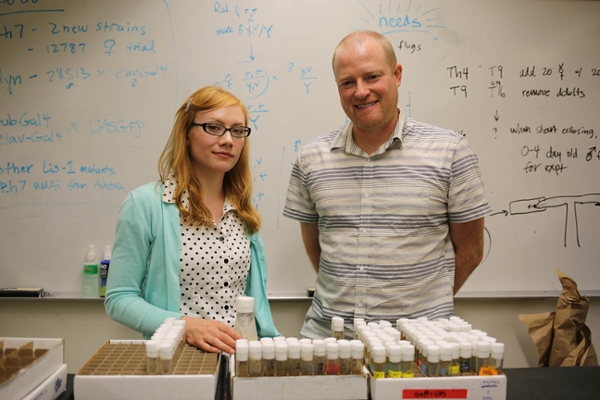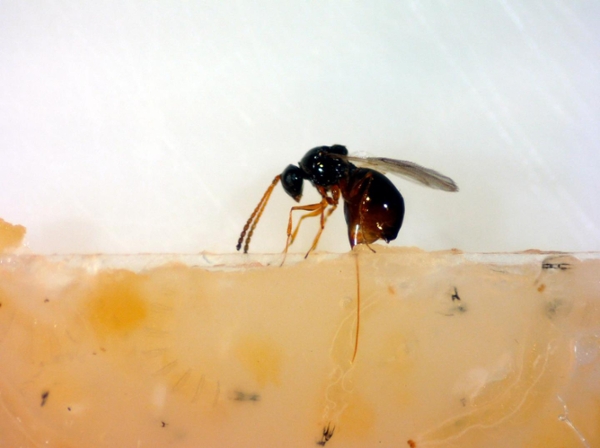
IRIS login | Reed College home Volume 96, No. 2: June 2017
Reed biologists show how parasites drive evolution

Reed bio major Shelly Skolfield ’14 and Prof. Todd Schlenke examined swarms of fruit flies (thankfully bottled in vials) to investigate the role of parasites in evolution. The experiment—the first showing that parasitic infection increases recombination in animals—was published in the journal Science. Photo by Tom Humphrey
Parasites are the Rodney Dangerfields of the animal kingdom—they don’t get no respect.
But it turns out that parasitic infection can actually spur evolution and may even be partly responsible for the origin of sexual reproduction, according to a study published in Science by a team of researchers including Shelly Skolfield ’14, Prof. Todd Schlenke [bio 2013–], and colleagues at North Carolina State University.

BUZZ KILL. A parasitic wasp (Leptopilina heterotoma) inserts her ovipositor into a fruit fly larva, preparing to lay an egg in its body cavity. Sometimes fruit flies survive the attack by coating the egg with melanocytes, rendering it harmless. Otherwise, they're basically toast. Photo by Michael Martin
The researchers found that fruit flies that survived infection by parasites hatched significantly more diverse offspring, presumably to out-evolve the parasites that are trying to exploit them.
Shelly's experiment, which was an outgrowth of her senior thesis, provides a glimpse into the strategies that organisms employ to help their progeny stay one step ahead of the parasitic Joneses. She began by interbreeding typical fruit flies with a special strain of fruit flies with two mutant genes—one that turns their abdomens a shade of brown and another that makes their eyes look like microscopic disco balls. She then infected some of the flies with venomous parasitic wasps and examined their offspring for signs of recombination—a kind of genetic shuffling detected by looking at combinations of eye-type and body color.
Sure enough, the flies that survived wasp infection produced offspring with higher rates of recombination—they shuffled their genes more often.
“Making their offspring more diverse is one way for organisms to stay ahead of their parasites,” Prof. Schlenke says.
This is the first experiment showing that parasitic infection increases recombination in animals—a surprising result which implies that wasps and other parasites play an important role in evolution. "Parasites are a powerful but invisible force of nature," Shelly says.
To perform the experiment, she peered at more than 50,000 wasps through the microscope. “I love looking through the microscope,” she says. “But, yes, it was a lot of work.”
The findings also shed light on one of evolutionary biology's enduring puzzles—the origin of sex itself.
Sexual reproduction is, biologically speaking, a funny way to procreate. It is not nearly as efficient as asexual reproduction and involves myriad perilous complications, from finding a reliable partner to surviving the first date to haggling over wallpaper for the nursery. Why not just stamp out copies of yourself? It’s simpler, cheaper, and doesn’t require a profile on OKCupid.
The prevailing theory about the origin of sex is the Red Queen hypothesis, named for the scene in Through the Looking Glass when Alice and the Red Queen have to keep running just to stay in the same place. The idea is that the only way to stay ahead of predators, parasites, and all the other miscreants who want to eat your lunch is through constant evolution, and that sexual reproduction provides an effective mechanism for doing this because it allows individuals to combine their most successful traits.
The Reed team partnered with researchers from North Carolina State University, Baylor College, Winthrop University, and Emory University to write the paper. “I never imagined it would be published in Science,” she says. “I still can’t believe it.”
Shelly grew up in North Portland, graduated from Benson High School, and taught outdoor science camps at OMSI before deciding to come to Reed. She is currently working in the Reed biology lab and is planning to pursue a career in science education and science literacy.
Tags: bio, undergrad research, venomous parasitic wasps, STEM


LATEST COMMENTS
steve-jobs-1976 I knew Steve Jobs when he was on the second floor of Quincy. (Fall...
Utnapishtim - 2 weeks ago
Prof. Mason Drukman [political science 1964–70] This is gold, pure gold. God bless, Prof. Drukman.
puredog - 1 month ago
virginia-davis-1965 Such a good friend & compatriot in the day of Satyricon...
czarchasm - 4 months ago
John Peara Baba 1990 John died of a broken heart from losing his mom and then his...
kodachrome - 7 months ago
Carol Sawyer 1962 Who wrote this obit? I'm writing something about Carol Sawyer...
MsLaurie Pepper - 8 months ago
William W. Wissman MAT 1969 ...and THREE sisters. Sabra, the oldest, Mary, the middle, and...
riclf - 10 months ago